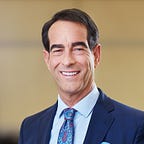How to Use Criticism Like Steve Jobs
One of the best examples I know of someone who created and delivered value — while welcoming criticism — is Steve Jobs.
Jobs’ life, including his successes and failures, are well documented and fascinating. As you may know, Jobs was not a success right away. In fact, it wasn’t until his second stint at Apple that he delivered real value and created the momentum and brand for which he’s most famous.
Creating Value
Jobs did not invent the cell phone. He just made a better one — the iPhone, one of the most popular cell phones and platforms in history. That iPhone, of course, has spurred many others to add to that value by creating unique apps that work with Apple’s iOS — well over 2 million apps as of late summer 2017, in fact.
Jobs did not invent the digital music player either. When he saw the technology, however, he realized the potential of putting over a thousand songs in your pocket, and so began the iPod. At the time, the music industry viewed Jobs as a threat. They resisted his idea that someone could download a song on iTunes for 99 cents. That would destroy everything, they said — people needed to buy 12 songs on an album to support the music industry, right? Nope. Jobs told the industry it would actually sell more music. And it did.
The music industry was, at the time, what I call scarcity-minded. Now, however, that same music industry is forever grateful for Steve Jobs and his iTunes technology, which has opened up the market for any artist to sell individual songs. Millions upon millions of song downloads around the world have proven Jobs was right.
Welcoming Criticism
Steve Jobs was a master at welcoming criticism and using it to fine tune Apple’s products. He learned early on that a healthy dose of failure, negative experiences and criticism can actually be some of your most valuable research and development (R&D).
For example, when Jobs first introduced the iPod, critics said it was too big; joggers, for example, didn’t want a heavy device strapped to their arm. Jobs listened to that criticism and soon came out with the iPod Nano. Later when more critics came down on the Nano, saying it was still too long, Jobs introduced the Shuffle. Next up was the iPad. The critics: “Why do we need a tablet? We already have laptops, phones and desktops.” Jobs proceeded anyway. Then he listened to the critics who said the tablet would never fly. Too big for a purse. And out came the iPad Mini — the perfect size for a purse. Success bred success, and so it continued with other Apple products.
With each new product, Jobs took the negative feedback and turned it into gold. He had just the right mix of resources and ingenuity. Together with the people and products worldwide who have contributed to the iTunes and Apple Store ecosystem, the company has created abundance.
Putting it to Work
Creating and delivering value while welcoming criticism is, of course, not a skill unique to Steve Jobs and Apple. But we can apply similar strategies at work and for our clients and in our personal lives.
At Live Abundant, we teach how to use our unique knowledge, attitudes, skills and habits (KASH), and pass them on to our posterity for generations to come through what we call a family Legacy Bank. When our attendees hear and experience these messages, they suddenly realize something is missing in their lives and they want it — as Steve Jobs did with his iPod, iPad and iPhone. That’s creating and delivering value. Then, as we sincerely listen and learn from our customers’ feedback and criticism, we make our messages even stronger.
Let’s look at our own lives, and businesses, to see where we can create and deliver more value. Listen to the constructive criticism. It comes from the people we trust at work, at home and in our neighborhoods. Consider the source of the feedback, and if it’s from sources we trust, let that feedback become our own R&D to help us improve the way we work and live. Hopefully, in the end and in our own sphere, we can leave a legacy as impactful and abundant as Steve Jobs did.
Call To Action
Want to know more about how to live an abundant life? Click here to get a copy of my newest book, “Entitlement Abolition” for FREE (just pay shipping). Learn how to lead your family and your legacy from “me” to “we.”
